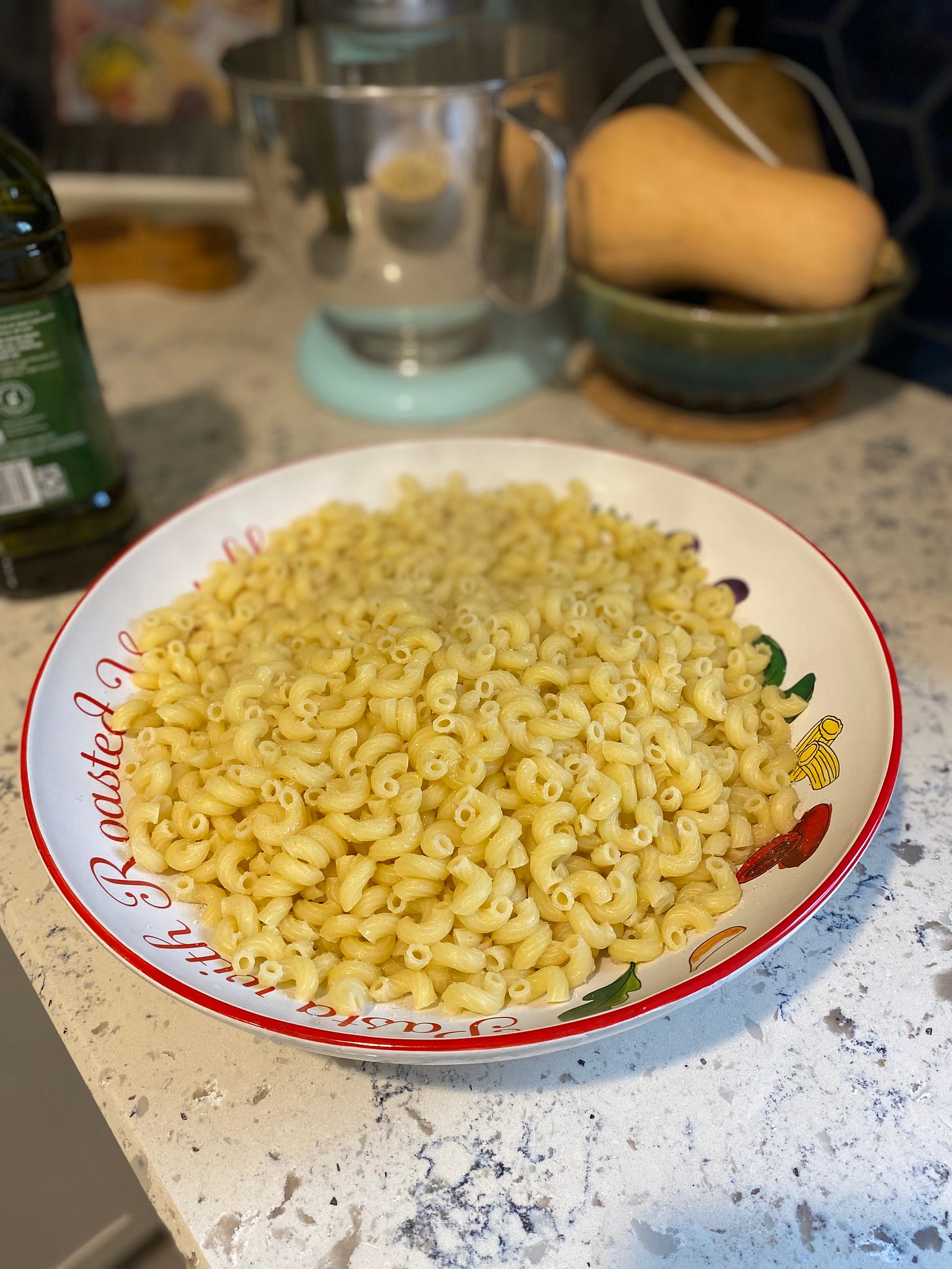When Does Parenting Advice Feel Good?
A-ha moments, more questions and less answers
I am on a live thread for the Cult of Perfect, a new podcast collaboration between Sara Petersen and Virginia Sole-Smith about “the intersection of motherhood, public performance and bodies”. Today’s lively discussion is about where perfectionism shows up in our own lives. People are connecting over shared challenges with personal goals, the cleanliness of their home and of course, my personal perfection puddle-- parenting. The exchanges are light and fun but it’s also clear these expectations are difficult for many. One participant mentions their expectation for family dinner (the kind where everyone sits, eats what is served and engages in conversation). Virginia Sole-Smith responds with something along the lines of don’t even try for the structured family dinner until your youngest child is 3 years old. She also notes that families should define what family dinner means for their unique household and ends with a reminder that you have permission to opt out of this particular practice for your family. I read this and feel a deep sigh of relief.
I have 4 kids, all 2 years apart which means I have never had a time where the youngest child is over the age of 3. There are a lot of variables when it comes to our dinner: differing ages, sensory needs, food allergies and feeding differences. As a psychologist, I am aware of the research on the benefits of family dinner in regards to the correlation of better mental health outcomes and so on. In addition, I grew up having family dinner almost every night. Family dinner has always felt like a must-do. And yet implementing it over the last 8 years of parenthood has been a variable experience (worth a fuller post in the future). Let’s just say it’s been hard and it has rarely looked the way I thought it would unfold.
Virginia’s advice on the thread is what I need to hear. Family dinner for me is a “should” that shows up, even when you close it in a cabinet, it routinely pops right back out. I know that this is not the first time I have heard advice along these lines but today I actually absorb it.
Messengers and messages everywhere
Parents are constantly consuming advice. It comes from doctors, teachers, experts, influencers, family and friends. With the tapping of a few keys, you can read about almost anything related to raising children. The messengers vary from having formal expertise to knowledge rooted in lived experience. The setting of delivery can be classrooms, doctor’s offices, zoom rooms or the line at the grocery store. The format of advice is peer-reviewed journals, pamphlets, advice columns, anecdotes, video clips, books, podcasts, courses and Instagram tiles. The manner of delivery has many tones: tough love, authoritative, prescriptive, compassionate and other styles. There are many different flavors of messengers and messages out there. Just as there are many kinds of parents (or consumers). With so much, how do we find what we need?
What we need
Need is tricky. It’s squirmy to define. We can get closer by looking at what it is not. Finding what we need may or may not be “what works” to use the phrase so often linked with parenting advice. Defining what works requires agreement on what you are working towards and that can mean many different things. What “works” is a query for another day. Then there are the messages we are influenced by, which we likely need less of in our lives. On the influence playground, social media, messages appear as sheep only to be a wolf at heart. Spotting messages that are unhealthy, distracting, unsuitable, confusing, inadequate or harmful is a developing skillset for navigating the modern landscape of parenting advice. Not sure that many parents were aware just how much they would have to use this skillset.
But where does finding the information that we need fit in? It’s ill-defined because it will be unique to the person, the family, the child or the relationship. It may feel:
Helpful
Empowering
Comforting
Validating
Hopeful
Enriching
Liberating
Inspiring
There are additional factors like the timing because knowing information does not equate to the ability to use it. There are the pathways of the message, like who the messenger is and how this information finds you (or you find it).
These questions itch my brain. And why? Because parenting is hard. We currently live in an environment where the information is both too much and too little. And in this little corner of the universe, I both absorb and offer advice. A consumer and a messenger. It is a cautiously optimistic endeavor.
Sometimes what we really need…is to know it’s okay.
Family dinner serves many families (oh yes, pun intended). Family dinner is a not yet for us. Or it might be a not right now or a not like that or a not at all for us. And that is okay.
Is there someone that has given you parenting advice you needed?
Please share in the comments.




I really enjoyed this article! It’s something I’ve totally gotten caught up in. I was raised in a *very* different environment than what we have in the West. So for me at least, I’ve got the inherent understanding that doing things differently isn’t bad and making sure a child feels loved goes a long way (especially in forgiving parenting mistakes). To answer your question though, I think parenting advice feels good when it comes with confirmation bias 😜
this is such a great perspective! so much parenting advice seems designed to make us feel a little bad--increasingly so we'll subscribe/join/otherwise pay to learn more from that very advice-giver!